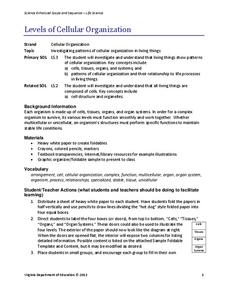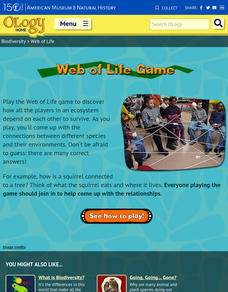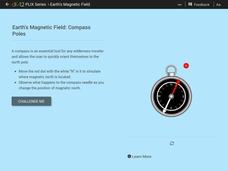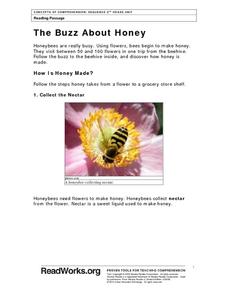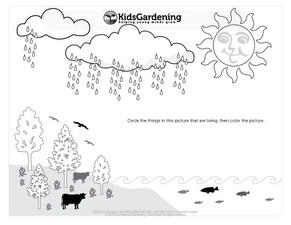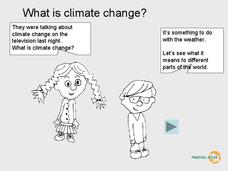K12 Reader
Plant Life Cycles
Plant life cycles are the focus of a life science worksheet that is designed as a reading comprehension exercise. Readers respond to five questions based on the passage.
Curated OER
What's in a Graph?
How many yellow Skittles® come in a fun-size package? Use candy color data to construct a bar graph and a pie chart. Pupils analyze bar graphs of real-life data on the Texas and Massachusetts populations. As an assessment at the end...
Virginia Department of Education
Levels of Cellular Organization
What an eccentric way to learn about each level of cellular organization! Allow emerging biologists to utilize white paper and create their own foldable charts to describe each level of organization in the body. You may also adapt the...
American Museum of Natural History
Web of Life Game
Get caught in a web of learning. Classmates play a game to build a web to model the interaction of species that live in a specific ecosystem. They each assume the role of one species and work together, passing a ball of twine to indicate...
Kentucky School for the Deaf
Levels of Organization within an Ecosystem
From tiny organisms to entire biomes, young scientists examine the interdependent relationships tying all living and non-living things together with this collection of ecology resources.
Virginia Department of Education
Cell Division
Searching for simple ways to teach mitosis to high schoolers? Using colored chalk and onion root tips, pupils visually demonstrate what they view when looking through the lens of a microscope. There are also various ways to expand the...
Cornell University
Let’s Raise Lacewings
Young entomologists explored beneficial insects and how they help control pests in the first lesson of the series. Now class members take a close look at the lacewing, which is a beneficial insect.
Curated OER
Aerobic/Anaerobic Respiration
Both aerobic and anerobic respiration are introduced in this succinct PowerPoint. The chemical equations for both are included. The last slides give instructions for a lab activity in which pupils use a gas sensor to measure the...
Curated OER
Evidence of Photosynthesis
Hands on science is the way to go! Learners conduct a lab experiment to help them explain how plants make food through photosynthesis. They test for the presence of starch in leaves using iodine solution and identify the basic things...
Virginia Department of Education
Thermochemistry: Heat and Chemical Changes
What makes particles attract? Here, learners engage in multiple activities that fully describe colligative properties and allow the ability to critically assess the importance of these properties in daily life. Young chemists...
American Museum of Natural History
A Whale of a Tale
What's the most interesting fact about a blue whale? Learners read an interview about the similarities between the Titanosaur and the blue whale displays at the American Museum of Natural History. Pupils learn not only about blue whales...
CK-12 Foundation
Earth's Magnetic Field: Compass Poles
You'll be strangely drawn to this activity! Physical science pupils learn how compasses work in an interesting interactive. The content covers magnetic poles, Earth's magnetic field, and what would happen if Earth's poles swapped places.
Virginia Department of Education
Building a DNA Model
It has been decades since the discovery of DNA. Still, activities such building this DNA model allow blossoming scientists to better understand the components that form this overall structure. During this activity, they will also...
The Science Spot
Flower Basics
Learn about plants and pollination with a worksheet about the parts of a flower. After labeling the anatomy of a flower using a word bank, kids explain the difference between self-pollination and cross-pollination, and unscramble...
Curated OER
Plant Diversity
Here is an all-encompassing overview of the plant kingdom! In this worksheet, beginning botanists describe characteristics of the four different plant phyla, explain various life cycles, differentiate between monocots and dicots, and...
Virginia Department of Education
Evidence of Evolution
What an impression fossils make! In this activity, aspiring paleontologists view fossils and construct a timeline to further understand how the lack of natural adaptation caused historical organisms to become extinct. While they...
Curated OER
The Buzz About Honey
What's the buzz these days? Learn some fun and interesting facts about honeybees with an informational reading passage, including the steps for successful pollination and honey creation.
National Gardening Association
Living Things Coloring Page
A simple assignment requires little life scientists to identify what is alive. Rain is falling, the sun is shining, birds are flying, fish are swimming, and students simply circle the items that are living.
Curated OER
What is An Insect?
Students investigate the concept of an insect. They conduct research about six different insects and identify the different body parts. Students look at the life cycle of the developing monarch butterfly. They also use the library to...
Curated OER
What is Wind Chill?
Students calculate wind chill using a mathematical formula. In this earth science lesson, students compare the wind chill in Antarctica to that of their local area. They explain how this can lead to hypothermia.
Curated OER
Pollution - What is It Doing to Us?
Students recognize some forms of pollution. In this science lesson plan, students recognize and understand some of the devastating effects of the acid rains and other possible factors that are contrary to the pH balance of nature.
Curated OER
What is Climate Change?
Students research climate change. In this environmental lesson, students view a PowerPoint slideshow about climate change and identify the ways that climate change affects life on Earth.
Curated OER
What Ocean Animals Do Worksheet
In this ocean animals learning exercise, students draw lines to match pictures of ocean animals to their descriptions, 6 total. A website reference for additional resources is given.
Curated OER
What is life? Word Search
In this biology worksheet, learners locate and identify various vocabulary terms related to life biology. There are 48 words located in the puzzle.


